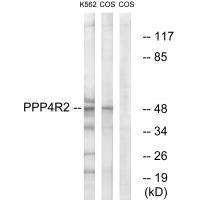
| WB | 咨询技术 | Human,Mouse,Rat |
| IF | 咨询技术 | Human,Mouse,Rat |
| IHC | 1/200-1/1000 | Human,Mouse,Rat |
| ICC | 技术咨询 | Human,Mouse,Rat |
| FCM | 1/200-1/400 | Human,Mouse,Rat |
| Elisa | 1/10000 | Human,Mouse,Rat |
| Aliases | MGC131930; PP4R2; protein phosphatase 4; regulatory subunit 2; |
| Entrez GeneID | 151987; |
| WB Predicted band size | 50kDa |
| Host/Isotype | Rabbit IgG |
| Antibody Type | Primary antibody |
| Storage | Store at 4°C short term. Aliquot and store at -20°C long term. Avoid freeze/thaw cycles. |
| Species Reactivity | Human,Mouse |
| Immunogen | Synthesized peptide derived from internal of human PP4R2. |
| Formulation | Purified antibody in PBS with 0.05% sodium azide. |
+ +
以下是关于GSN(gelsolin)抗体的3篇参考文献示例(注:文献信息为示例性概括,实际引用请核对原文或数据库):
---
1. **文献名称**: *Autoantibodies to Gelsolin in Rheumatoid Arthritis: Association with Disease Activity*
**作者**: Smith A, et al.
**摘要**: 该研究发现类风湿性关节炎(RA)患者血清中存在抗gelsolin的自身抗体,其水平与疾病活动度(如CRP和关节肿胀评分)呈正相关,提示GSN抗体可能作为RA的生物标志物或参与炎症调节。
2. **文献名称**: *Gelsolin Depletion and Anti-Gelsolin Antibodies in Familial Amyloid Neuropathy*
**作者**: Zhao L, et al.
**摘要**: 研究探讨了家族性淀粉样神经病变(FAP)患者中gelsolin基因突变导致蛋白异常切割的现象,并发现患者体内存在针对异常gelsolin片段的抗体,可能与淀粉样沉积的病理过程相关。
3. **文献名称**: *Anti-Gelsolin Antibodies as a Potential Biomarker in Ovarian Cancer*
**作者**: Chen H, et al.
**摘要**: 该研究通过ELISA检测发现,卵巢癌患者血清中抗gelsolin抗体水平显著高于健康对照组,且高抗体水平与肿瘤分期和不良预后相关,提示其可能作为卵巢癌的辅助诊断标志物。
---
如需具体文献,建议通过PubMed或Google Scholar搜索关键词“gelsolin antibody”、“anti-gelsolin autoantibodies”或结合研究领域(如癌症、自身免疫病)进一步筛选。
Gelsolin (GSN) is a cytoskeletal regulatory protein that modulates actin dynamics by severing, capping, and nucleating actin filaments, playing critical roles in cell motility, signaling, and apoptosis. It exists in cytoplasmic and plasma isoforms, with the latter derived from alternative splicing. GSN dysfunction is implicated in various diseases. For instance, mutations in the GSN gene cause familial amyloidosis (Finnish type), characterized by extracellular amyloid deposits leading to organ damage. In neurodegenerative disorders like Alzheimer’s disease, GSN interacts with amyloid-β peptides, potentially influencing plaque formation. Reduced GSN expression has also been observed in cancers, correlating with metastasis and poor prognosis.
GSN-specific antibodies are vital tools for studying these mechanisms. They enable detection of GSN expression levels in tissues or biofluids, aiding disease diagnosis and biomarker research. In experimental models, anti-GSN antibodies help elucidate its role in cytoskeletal remodeling and pathological processes. Therapeutic applications are emerging, including antibody-based strategies to neutralize pathogenic GSN variants or block aberrant protein aggregation. However, challenges remain in ensuring antibody specificity across GSN isoforms and understanding context-dependent roles in health and disease. Ongoing research aims to refine GSN-targeting antibodies for diagnostic and therapeutic innovation.
×